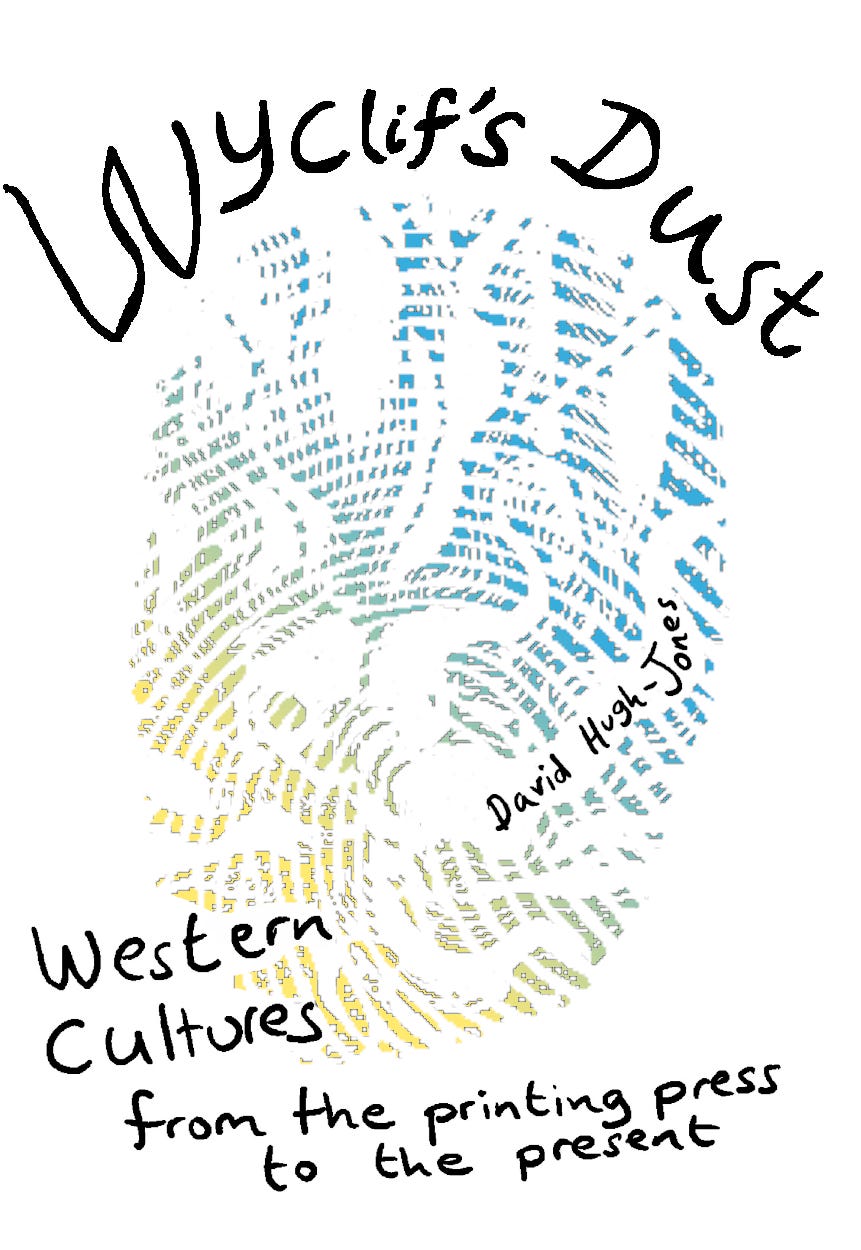Cultural endosymbionts
Coming to grips with historical pessimism about new communications technology
Here is a common critique of worries about smartphones, social media, screen time and the like:
People have always freaked out about new communications technology. In the eighteenth century they worried about novel reading. In the twentieth century they worried about movies, radio and then television. Twenty years ago, it was violent computer games. Actually, Plato even worried about the written word, as well as about sculpture and visual arts! This is just the latest wave in a long run of concerns.
The implication is that the worries are overblown, alarmist, Luddite, or driven by a threatened establishment. You can find many good examples of this argument at Pessimist’s Archive, “a project to jog our collective memories about the hysteria, technophobia and moral panic that often greets new technologies, ideas and trends”. The content there goes beyond communications technology and encompasses fears about e.g. the bicycle, but historically, communications technologies do seem to generate a disproportionate amount of concern.
On the one hand, yes, this argument is factually correct! 18th century writers really did worry about novel reading, especially by women, the quotes from Pessimist’s Archive are real, and Plato’s arguments are there for all to read.
On the other hand, I feel there is a risk of us exercising the “enormous condescension of posterity”. When past concerns seem weird, our first historical response should not be “ha ha, those idiots”.
Also, intuitively, contemporary concerns about screen time don’t seem stupid as of today. I mean sure, maybe this too shall pass and we’ll look back at the 2010s with smartphone nostalgia, just as people now wax nostalgic about 1990s computer user interfaces, when at the time they saw Windows as the face of the evil Micro$oft monopoly. But even if so, it’s hard to call our worries ill-founded. Many of us have struggled to manage our time productively in the age of instant pocket entertainment. Even a recent Prime Minister had a Fruit Ninja addiction. There are multiple apps, books, and courses dedicated to managing procrastination; our willingness to pay for these fixes suggests that the problem is real. And is social media hurting democratic politics? Admit it’s having some effects, even if they are uncertain.
Fights about media reflect real social conflicts
A good start in resolving this dilemma would be to recognize the power of media and communications technology to organize society. That is not something that economists are naturally very good at: their go-to model of society is a market, where the only communication takes place through impersonal price mechanisms, and even this is often just assumed to work in the background. To understand media, it helps to read Marshall McLuhan, Elizabeth Eisenstein and Walter Ong, not just Hayek and Becker — or further back, Condorcet and not just Smith and Marx.
Anyway here are some examples:
There has repeatedly been bitter controversy about the place of icons and images within Christianity. The Puritans were famously image-breakers but the original iconoclasts were a schism within Orthodox Christianity. This is not an arbitrary theological dispute. Actually, it’s not even (just) a deeply motivated theological dispute. Here is a hypothesis: the use of images constantly threatened to reconfigure Christianity or other monotheistic religions back towards “natural polytheism” of the local saint. I say “natural polytheism” not because polytheism is more natural to the evolved human mind — maybe it is or isn’t, I don’t know — but because it is easier for individual communities to have their own religious practices than it is for the whole larger community to maintain a single uniform religious practice. So iconoclasm is a way to maintain uniformity: we all worship the same God everywhere. Uniform religious practice has payoffs for everyone, because it is a form of coordination. But it’s a public good between communities. In image-breakers’ words, images are idols: physical things worshipped as gods. Perhaps that captures an important part of early religion. The first images which resembled conscious beings, engaging the part of the brain that recognizes intentionality, must have seemed truly mysterious and daemonic to their viewers.
Novels were rivals to the religious entertainment/edification complex of sermons, Bible-reading and so on. You can read improving literature, full of strict moralising. But there will always be temptation in a free market for someone to make the literature a little less improving and more, uh, fun. Of course, we can’t take the claims of one side at face value in this argument. Novels threatened the discursive power of the strict religionists. And indeed eventually they won, in the sense that modern morality has probably been more shaped by literature than by religion. (Over the past hundred or two hundred years, obviously our moral culture also retains deep religious roots, but those roots were put down in earlier centuries.)
Worries about films, TV and screen media are not that different from our own. The smartphone just intensified everything. There were always concerns about the content people were consuming and its ability to sustain democratic discourse. Adorno said that he left every film stupider and worse than when he went in. The most insightful analysis of social media’s effect on the public sphere was written by Jürgen Habermas in the 1950s, just without the adjective “social”. In 1985, Neil Postman wrote Amusing Ourselves to Death about TV’s dumbing-down effect. But again, there are winners and losers from the rise of different media forms: Kennedy famously won the television audience in 1960 (but did he though?), Reagan was a natural performer on-screen, and now Trump has mastered the art of the tweet.
Cultural endosymbionts
Worries about new media regularly arise, seem important at the time, but then look overblown in hindsight. Is there any other explanation for that than “hysteria, technophobia and moral panic”?
An endosymbiont, as you know, is an organism that lives inside another organism in a mutually beneficial relationship. Endosymbionts may evolve from endoparasites, because killing your host is usually not helpful for your own survival. A famous example is mitochondria, parts of the eukaryotic cell which probably evolved from originally free-living bacteria.
As that example shows, endosymbionts need not simply settle down into peaceful coexistence. They can have far more dynamic effects. The mitochondrion’s reverse takeover of the cell provided the host with a new power source, respiration. The resulting hybrids became the order of eukaryotes, which includes every animal and plant.
Communications technologies are “extensions of man”, as Marshall McLuhan said: they can deeply alter human consciousness, capabilities and social organization. But those effects are not deliberately designed in advance. Nobody could have predicted all the effects of the idol, the printing press, the TV or the smartphone. Instead, think of them as cultural parasites. They invade portions of human brain space. Like parasites, they survive by spreading, not necessarily by making themselves useful. Local idols genuinely do threaten the uniformity of large scale book religions. Novels really are rivals for scarce attention with other activities. Smartphones are in fact quite addictive.
As they spread, these cultural parasites have dynamic effects. They and their host societies change in a process of mutual accommodation. They become cultural endosymbionts, essential to how the host society functions:
Religious icons became accepted within Orthodox Christianity. Theology developed to give them a place within the religious structure, distinguishing between icons and idols and hedging icons about with strict rules of form and content. Iconoclasm was partly a result of heavy-handed centralizing by Byzantine emperors; in turn, the acceptance of icons presaged a more balanced relationship between the centre and periphery.
Novels, films and television gained acceptance as part of “high culture” because deeply compelling work was produced in these media. Workers like Austen or Kubrick had enough serious things to say that they became impossible to ignore. But that was not an anodyne process where people, so to speak, just shuffled up to make room for the new art form at the table. In particular, the rise of the novel was part of the process that defined “high culture” as a secularised alternative to religion, a teaching tool and a way of spreading what Matthew Arnold called “sweetness and light”. And this process generated winners and losers in terms of cultural influence. At the end of it, Lytton Strachey can write in Eminent Victorians of Thomas Arnold, Matthew’s father and the reforming headmaster of Rugby:
… how was he to achieve his end? Was he to improve the character of his pupils by gradually spreading round them an atmosphere of cultivation and intelligence? By bringing them into close and friendly contact with civilized men, and even, perhaps, with civilized women? By introducing into the life of his school all that he could have the humane, enlightened, and progressive elements in the life of the community? On the whole, he thought not…. He would treat the boys at Rugby as Jehovah had treated the Chosen People; he would found a theocracy….
The joke is that Thomas Arnold was on the religion side of the original culture war, and by the time Strachey wrote, it’s obvious that to educate young people, you need to bring them “an atmosphere of cultivation of intelligence… friendly contact with civilized men,” i.e. into the Bloomsbury Set.
Lastly here is Plato’s argument in Phaedrus about writing:
I cannot help feeling, Phaedrus, that writing is unfortunately like painting; for the creations of the painter have the attitude of life, and yet if you ask them a question they preserve a solemn silence. And the same may be said of speeches. You would imagine that they had intelligence, but if you want to know anything and put a question to one of them, the speaker always gives one unvarying answer. And when they have been once written down they are tumbled about anywhere among those who may or may not understand them, and know not to whom they should reply, to whom not: and, if they are maltreated or abused, they have no parent to protect them; and they cannot protect or defend themselves…. Is there not another kind of word or speech far better than this, and having far greater power — a son of the same family, but lawfully begotten?… I mean an intelligent word graven in the soul of the learner, which can defend itself, and knows when to speak and when to be silent.
To a modern person this is liable to seem deeply misleading. All today’s human store of knowledge could not exist without books, and personal teaching which Socrates recommends here could not possibly be an adequate substitute.
But that is history with hindsight. For the 1500 years after Plato wrote this, the most important books are the holy books of religions. And one way to look at these is indeed as vulgarisations of the quicksilver, face-to-face wisdom Plato wanted to pursue among small groups of elites. Think of another book of his, the Phaedo! There Socrates defends the immortality of the soul, and gives a vision of the afterlife:
… and when the dead arrive at the place to which the genius of each severally guides them, first of all, they have sentence passed upon them, as they have lived well and piously or not. And those who appear to have lived neither well nor ill, go to the river Acheron, and embarking in any vessels which they may find, are carried in them to the lake, and there they dwell and are purified of their evil deeds…. But those who appear to be incurable by reason of the greatness of their crimes… such are hurled into Tartarus which is their suitable destiny, and they never come out.
But this vision is hedged around with doubts. He describes it as “a charming tale” which he admits he can’t prove — “and even if I could, I fear, Simmias, that my life would come to an end before the argument was completed.” And it is embodied in a dialogue in which even those who agree with Socrates are encouraged to raise tough objections to his claims.
In subsequent history, book religions take a very different attitude to their own world view. It is written down in books which are viewed as unchanging, holy wisdom — “one unvarying answer”. And disputes about their interpretation end with the losers being condemned as schismatic, not encouraged to ask more questions. In this light, Plato’s claim about the effect of the written word does not look so crazy.
But of course, there is much more to say about the positive and transformative effects even of the pre-printing, pre-science book. Again, Plato is pointing at a real concern, but he could never have foreseen just what vast and dynamic changes would be wreaked by this communications technology.
Don’t stop worrying
To sum up, cultural endosymbiosis is a process in which society accommodates itself to new communications technology, and vice versa. It mitigates bad effects and perhaps strengthens valuable ones. It generates winners and losers, and it is also typically dynamic, unleashing effects that were unforeseen in the short run. In fact, new technologies often only show their true scope and power once the rest of society has come to grips with them, a process that can take decades or centuries.
Biological metaphors for social phenomena are always risky:
Let biological metaphors back into social science
Biological metaphors fell out of fashion in the second half of the twentieth century, for two reasons. First, they seemed to have dangerous consequences, like labelling hated minorities as parasites or bacilli. They suffered by association with social Darwinism, which had drawn direct connections between biology and society.
In particular, for biological organisms it’s uncontroversial that the parts should benefit the whole, whereas in social “bodies”, the general interest is never uncontroversial. We should acknowledge that new technologies create winners and losers, without, on the other hand, reducing cultural progress to a meaningless power struggle. Smartphones are going to change the world, whatever we say, and local journalism is probably a net loser from this process, whilst tech billionaires and the owners of entertaining cats are probably winners. But that doesn’t mean we can afford not to evaluate the smartphone’s effects and think carefully about how we adjust them to our society and vice versa. “People have always worried…” is true, but it doesn’t prove we shouldn’t do the same ourselves.
If you liked this post, why not subscribe and support my writing? It costs just £3.50/month, and yearly subscribers get a great big 40% discount, plus a free copy of my book, which goes deeply into the topics I’ve touched on here.






Certainly!
Typically dynamic.
Hope you are singing to the little cherub. My Filipina perinatal nurse was excellent but she did leave my whole patient file on the roof of her car and as we both drove away from the meeting I saw them scatter in the wind across the road. We jumped out to get them but who knows how many of most private details were leaked in the village.
The hospital had a major cyber attack the year after so everything was leaked i suppose!
It’s wild time.